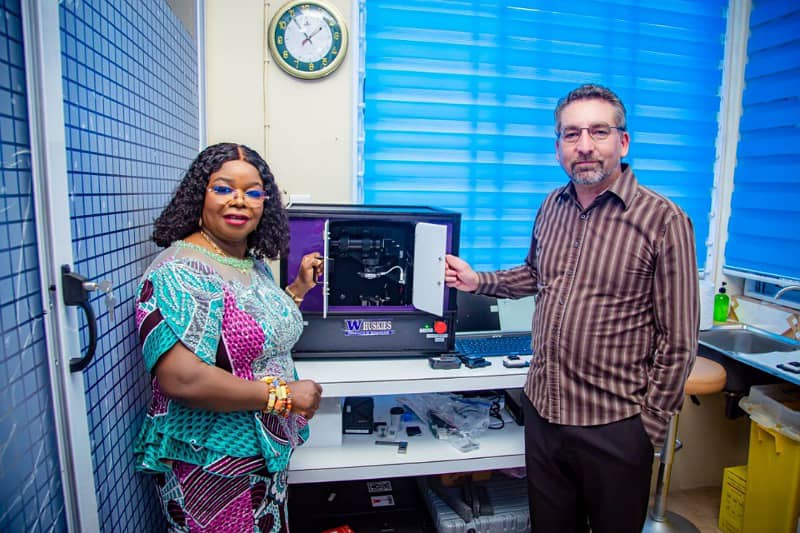CoreView, a revolutionary medical technology, has been introduced at Peace and Love Hospitals in Ghana, marking a significant advancement in breast cancer treatment. This innovative system allows for near-instantaneous diagnosis of breast cancer, delivering results within just 10 minutes at the patient’s bedside. Developed through a collaborative effort spearheaded by Dr. Beatrice Wiafe Addai of Peace and Love Hospitals, along with Professor Richard Levenson of UC Davis and Professor Eric Seibel of the University of Washington, CoreView eliminates the lengthy wait times typically associated with traditional biopsy analysis, which can often extend to days, weeks, or even months. This expedited diagnostic process allows for immediate treatment planning and initiation, substantially improving patient outcomes and potentially saving lives. The commissioning of the CoreView machine in March 2025 at the Oduom facility in the Ashanti region heralded a new era in cancer care, placing Ghana at the forefront of global innovation in this critical area of medicine.
The traditional process of breast cancer diagnosis involves the transportation of tissue samples to a specialized histology lab for analysis. This process is inherently time-consuming, creating anxiety for patients and potentially delaying crucial treatment. CoreView revolutionizes this process by enabling medical professionals to analyze biopsy samples directly in the procedure room, providing real-time diagnostic results. This immediate feedback empowers healthcare providers to initiate treatment plans on the same day, significantly shortening the time between diagnosis and intervention. Furthermore, CoreView supports remote diagnosis, allowing digital images of tissue samples to be transmitted to pathologists worldwide for expert consultation, further enhancing accessibility and diagnostic accuracy, particularly in resource-constrained settings.
Beyond its immediate impact on diagnostic speed, CoreView lays the groundwork for the integration of artificial intelligence (AI) in cancer detection. Dr. Wiafe Addai, also the President of Breast Care International (BCI), envisions a future where AI algorithms analyze tissue samples instantly, further enhancing accuracy and efficiency. This integration promises to democratize access to high-quality cancer care, particularly in underserved communities with limited access to sophisticated medical facilities. The prospect of AI-powered diagnostics holds immense potential for revolutionizing cancer care globally, making early detection and timely intervention a reality for a broader population.
The introduction of CoreView in Ghana represents a landmark achievement in global healthcare, setting a new precedent for rapid and accessible cancer diagnosis. Dr. Mark Edward Fauver, a representative from Professor Eric Seibel’s laboratory at the University of Washington, emphasized the seamless integration of CoreView with existing diagnostic methods, ensuring that traditional histology and molecular testing procedures remain available as a gold standard for verification. This ensures that CoreView complements, rather than replaces, established diagnostic practices. Ghana’s adoption of this cutting-edge technology positions the country as a global leader in innovative breast cancer care, demonstrating a commitment to improving early detection and ultimately saving lives.
Dr. Fauver commended Dr. Wiafe Addai for her unwavering dedication to developing CoreView and her tireless advocacy for improved breast cancer treatment access. This breakthrough technology is poised to redefine cancer treatment paradigms worldwide, offering faster, more accurate, and readily accessible diagnostic solutions for patients, particularly those in underserved communities. This initiative has the potential to significantly impact global health outcomes by ensuring that more individuals have access to timely and life-saving cancer care.
The implementation of CoreView at Peace and Love Hospitals signifies a transformative shift in cancer care delivery. This innovation provides hope for a future where cancer diagnoses are rapid, accessible, and accurate, ultimately contributing to improved patient outcomes and reduced cancer mortality rates. This groundbreaking technology promises to empower healthcare professionals with the tools to combat cancer effectively, offering a brighter future for individuals facing this challenging disease.














